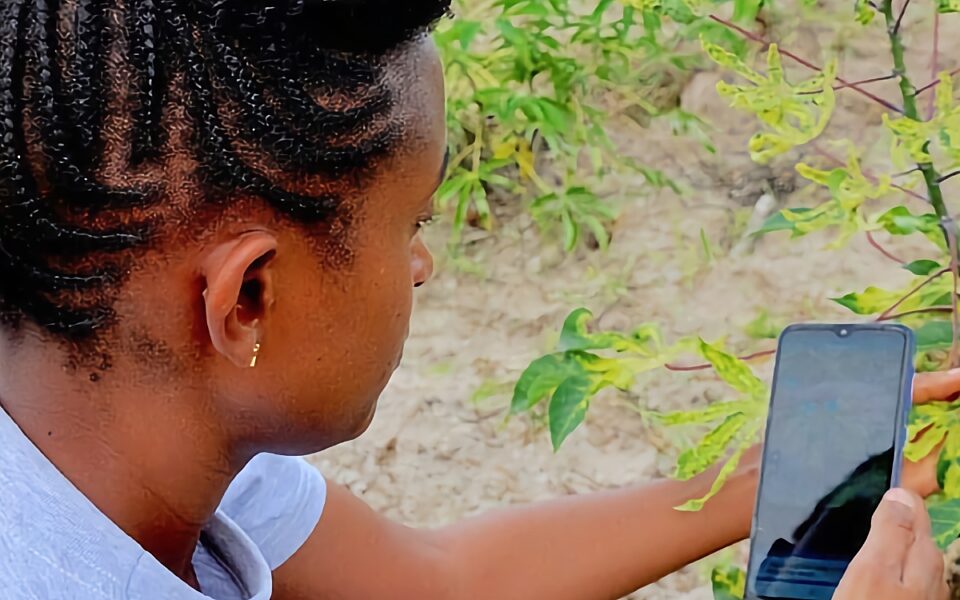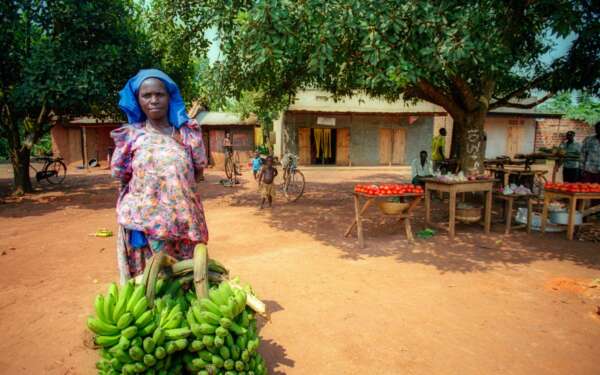
African Agriculture Under Climate Change
In his book, "How to Avoid a Climate Disaster: The Solutions We Have and the Breakthroughs We Need,” Bill Gates singled out CGIAR centers, which have been at the forefront of supporting the world to feed itself through research including developing improved higher-yielding varieties of important staples such as maize and rice, as doing work that is “indispensable in creating new climate-smart crops and livestock for the world’s poor farmers.”
PlantVillage NuruAI app among key innovations supporting poor farmers to cope with climate change
Status: Ongoing
In the book, Gates mentions some of the other innovations that CGIAR centers have developed to help smallholder farmers cope with the climate crisis. This includes a smartphone app that allows farmers to use the camera on their phones to identify specific pests and diseases attacking cassava, an important food and cash crop in Africa.
IITA, one of the CGIAR centers, has been addressing the threats posed by climate change to income and food security for smallholder farmers using a multi-pronged approach. This includes identifying and promoting crops that can build farmers’ resilience to climate change, such as drought-tolerant varieties and crops.
IITA’s basket of digital tools to tackle climate change
The Institute has, in collaboration with its partners, developed or co-developed a series of digital tools to boost productivity of important staples for smallholder farmers in sub-Saharan Africa. These tools address some of the most important challenges faced by farmers including lack of knowledge on good agronomic practices that can optimize yield, attack by pests and diseases and access to seeds of improved varieties. These digital tools include:
- Cassava SeedTracker—an innovative web-based app linking cassava seed producers and farmers, which also facilitates quality control through electronic seed certification conducted by national authorities.
- Akilimo—a set of tools developed to support farmers in making informed decisions on various agronomic practices such as fertilizer use, optimal planting dates, intercropping, and optimal weed management strategies.
- PlantVillage Nuru—an artificial intelligence platform for detecting cassava pests and diseases and providing advice on how to control them.
Artificial Intelligence for disease detection
“NuruAI helps me to easily identify diseases on my crops, especially during the selection of planting material. I have used it multiple times to select disease-free cassava cuttings used in demo sites. I also use it to train farmers or while diagnosing the cassava performance in the demo site,” says James Mugo, a Field Officer and Media Coordinator at PlantVillage Kenya.
Nuru, which means light in Swahili, uses Artificial Intelligence (AI) to support farmers to correctly diagnose major pests and diseases affecting their crops using their smartphones to capture images of diseased leaves. The app identifies the disease and pest damage and provides farmers with advice on control measures.
Mercy Tsuma and John Mayieka, Field Officers training farmers on how to use NuruAI in diagnosing diseases in Kenya (Credit: James Mugo)
The PlantVillage team at Penn State University in the USA applied AI with machine learning to train computers to recognize symptoms of cassava brown streak disease, cassava mosaic disease, cassava green mite damage, and the healthy condition from images of cassava leaves recorded and annotated by the IITA team in Tanzania.
An instant and offline disease recognition capability was then built into the smartphone app ‘Nuru’ which is now being widely used across Africa. The app can also diagnose the devastating invasive fall armyworm (FAW) on maize which is helpful as farmers often grow maize and cassava together.
The IITA team has been working with extension officers and farmers to validate the performance and popularize the technology. These include training the researchers, extension officers, seed inspection officers, and farmers in Kenya, Rwanda, Tanzania, and Uganda. The app has been found to significantly outperform trained extension officers in diagnosing cassava diseases.
An essential feature of NuruAI is that it links with the SeedTracker, another digital tool developed by IITA, which helps farmers identify the nearest source of healthy planting materials of improved cassava varieties. NuruAI has been used to monitor cassava diseases in 19 African countries, with Ivory Coast, Kenya, and Tanzania being the hotspots. The app is available for download from Google Play as ‘PlantVillage Nuru’.
This suite of cassava-focused digital tools will help to revolutionize information provision for farmers to enable them to improve their productivity.
IITA scientist James Legg, who has been working on the Nuru and Seed Tacker tools in Tanzania, says “Farmers across Africa face an unprecedented challenge from climate change. But we know that cassava is a crop that will be resilient to these changes. This new package of digital tools will put the power in farmers’ hands to boost their cassava yields and win at least one battle in the war against the menace of climate change.”
Image description: Mercy Tsuma and John Mayieka, Field Officers training farmers on how to use NuruAI in diagnosing diseases in Kenya (Credit: James Mugo)
For more information on IITA's work on climate smart agriculture, see the Research Program on Climate Change, Agriculture, and Food Security.
